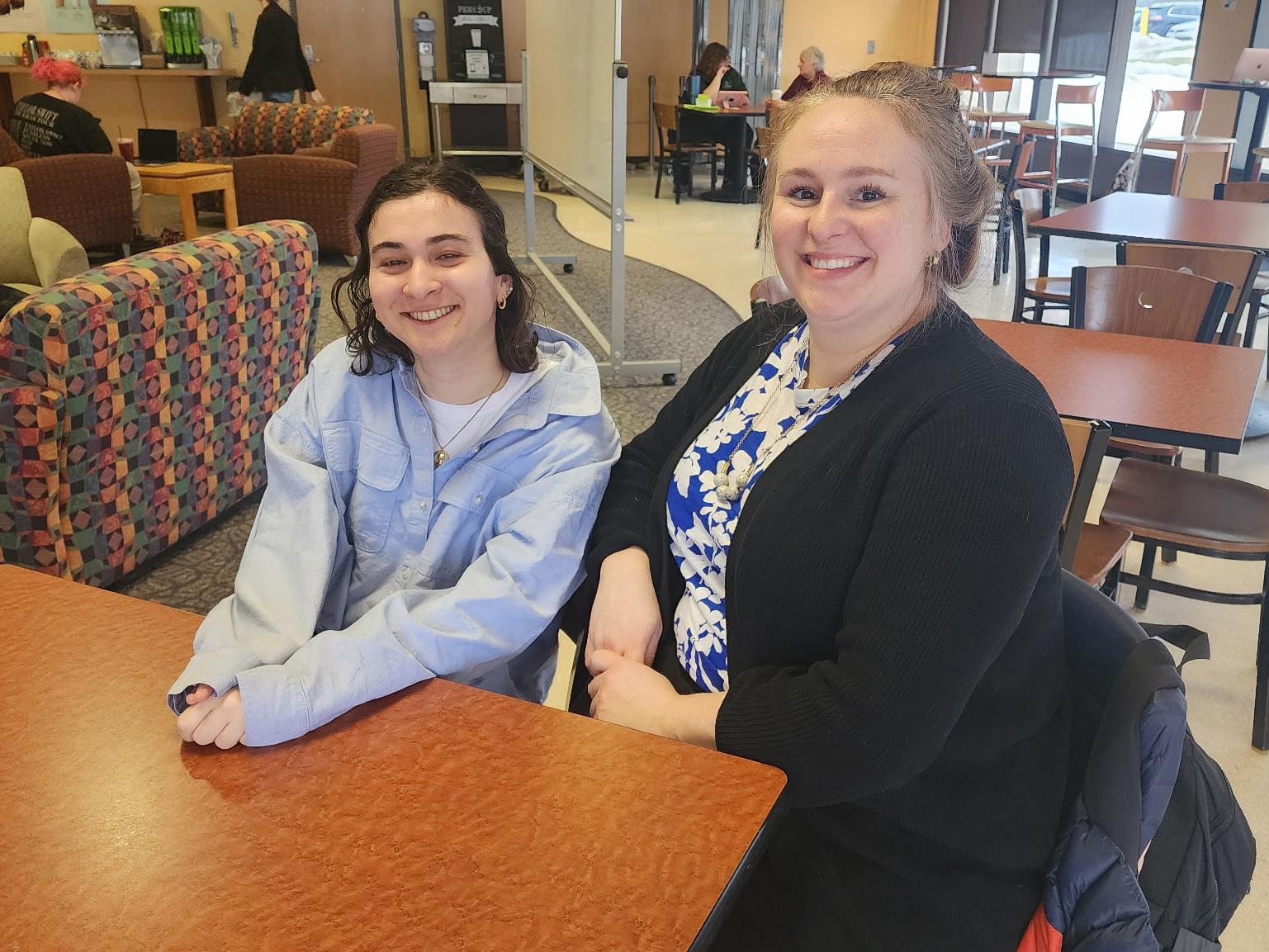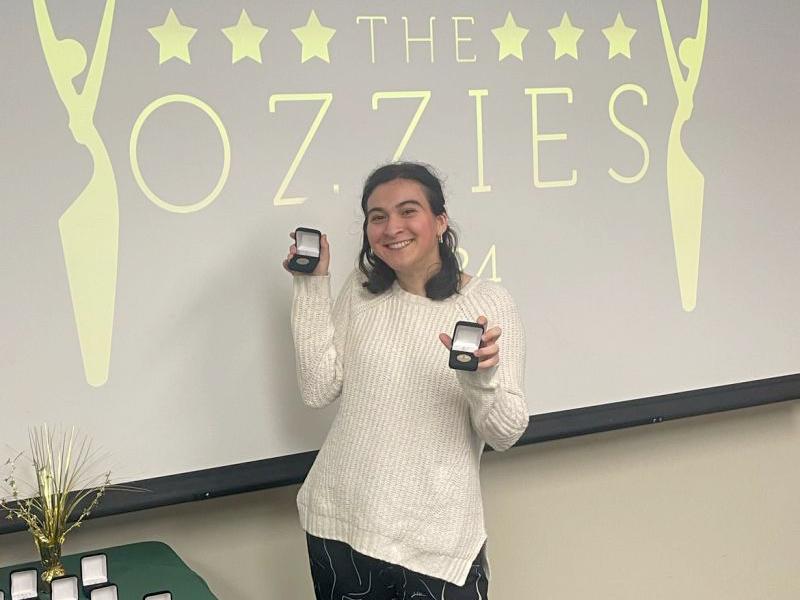For Katie Karlen, a SUNY Oswego dual major in psychology and public relations, a Quest poster presentation promoting a better understanding of neurodiversity comes from a longstanding interest.
“It’s been an interest for 23 years of growing up neurodiverse,” Karlen explained. “All this research really hits home for me. Growing up, many friends were neurodiverse as well.”
Estimates on the percentage of people defined as neurodiverse –- diagnosed with attention-deficit hyperactivity disorder (ADHD), autism, dyslexia or other neurological conditions –- range from 15 to 20 percent, with increased testing and awareness leading to greater identification among younger people.
Karlen’s Quest presentation, "Using Social Media to Raise Awareness and Increase Inclusivity for Neurodiversity," is an outgrowth of the psychology capstone project Karlen completed last semester, which turned into a poster presentation at the recent Eastern Psychological Association meeting in New York City. A grant from the university's Student Office of Research and Creative Activity.
That conference poster, "Identity Development and Students’ Perceptions of Strengths and Challenges," examined how neurodiverse students perceived their strengths and challenges in both academic and social settings. And while that was fulfilling, using the PR background to better foster understanding among a wider audience was the next logical step.
“I wanted to continue and use my creative side with a goal of presenting at Quest,” Karlen said. “I’m looking into how social media can make the topic of neurodiversity more inclusive, accessible and understandable. My research will determine the content.”
Quest, SUNY Oswego’s celebration of scholarly and creative activities, unfolds across the lakeside campus on Wednesday, April 23, after an April 22 evening kickoff poster session at its Syracuse Campus. For more information, visit oswego.edu/quest.
By the time Quest comes, Karlen hopes to have completed at least two social media videos and a mockup of an Instagram account that she would plan to launch with content that works, according to her research.
“I want to include information that is relatable and authentic,” Karlen said.
Karlen’s research examined the success of challenge videos –- the Ice Bucket Challenge for ALS being a foremost example –- and looked into how this might work in engaging ways to increase awareness of issues neurodivergent people go through all the time.
"I created original short-form video content to illustrate which style of videos on social media can drive engagement," Karlen noted. "One example is 'Never Have I Neurodiversed,' a viral-style video designed to spark open conversations about neurodiversity. I also created a 1–2 minute Instagram Reel Q&A with my mom, where she shares advice on parenting a neurodiverse child and discusses her experiences with the education system."
This part of the project interweaves both of her majors, Karlen noted.
"These videos serve as sample content for an Instagram neurodiversity advocacy account, applying psychological theories such as Social Cognitive Theory, Social Identity Theory and the Corporate Identity System," Karlen explained.
In working with her roommates, who are also neurodivergent, on content ideas, they have all learned even more.
“The process has really helped me understand neurodiversity better and get to a better place,” Karlen said. “It’s not closure, really, but more a new chapter of acceptance. It’s things I would have loved to tell my younger self.”
Making connections
Emily Bovier, associate professor and department chair in psychology, serves as a mentor for Karlen’s projects and is really the person who made Karlen feel comfortable declaring the major.
“She’s awesome,” Karlen said. “She’s been a really great mentor through this whole experience.”
“Katie and I met when Katie was enrolled in my seminar class, ‘Neurodiversity,’” Bovier recalled. “Katie showed strong initiative in our class and asked to work with me on my ongoing research, which I talked about in class. My research broadly relates to understanding neurodiverse student perspectives in higher education.”
“I wanted to learn more about neurodiversity, and she understood me completely, and we worked together on the best ways for me to succeed,” Karlen said. “We figured out everything I would have to work through, the best ways to do it and how to support what I want to accomplish in the future.”
“Katie's Quest project relates to the value of storytelling in dismantling preconceived notions about neurodiversity,” Bovier said. “Katie is passionate about stigma reduction and promoting effective support for neurodiverse students.”
Karlen hopes all the research, interest and developed skills come together to create more conversations and a better understanding of neurodiversity and the many types of it and people under that umbrella.
“Hopefully, it will help people realize that there are so many elements to neurodiversity,” Karlen said.
“Some people who are neurodivergent can feel very alone, and there are topics here that people just don’t talk about,” Karlen said. “I want people to feel understood, included, seen and related to. I want to provide that feeling of community.”
Bovier also noted how Karlen’s work is an example of the opportunities Quest offers not only for student presentations but also for enlightening others and promoting change.
“Conducting research and presenting at Quest is an invaluable experience for students to engage in critical thinking and develop professional development skills such as organization and communication,” Bovier said. “Students are able to find agency by developing their own projects, and this process can help students understand how research can help us make informed decisions in our daily lives.”

Katie Karlen, who is presenting a Quest poster promoting a better understanding of neurodiversity, meets with mentor and psychology faculty member Emily Bovier in Penfield Library's Lake Effect Cafe.




